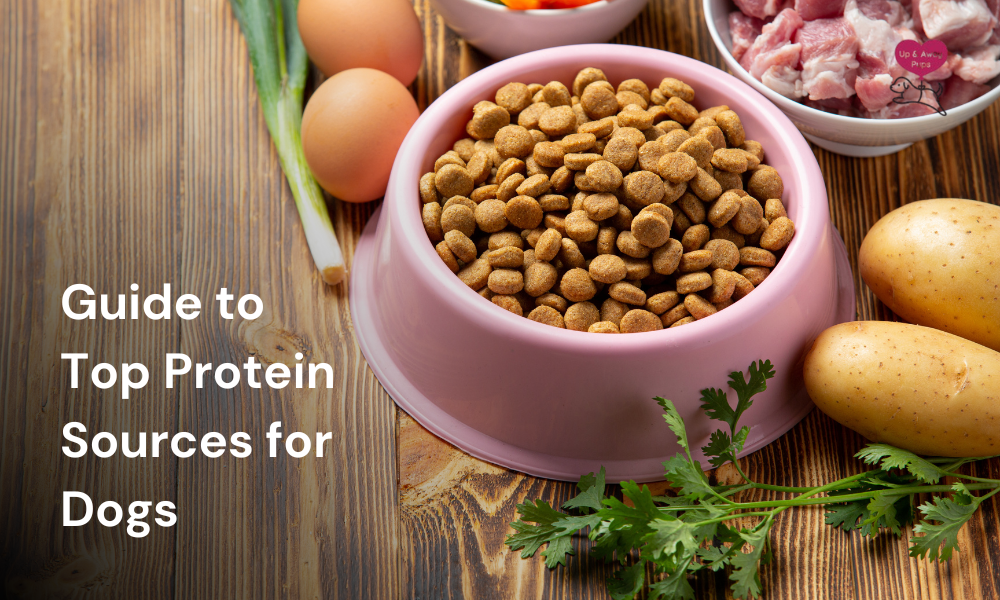Guide to Top Protein Sources for Dogs
Dogs need a balanced diet rich in essential nutrients, especially protein, for growth, cell repair, and overall health. This guide highlights top protein sources like chicken, beef, fish, and plant-based options like peas and lentils. Puppies require more protein (22–32%) than adults (18–25%) to support rapid growth. Combining animal and plant proteins provides balanced nutrition. Debunking myths, high-protein diets don't harm healthy dogs. Pairing protein with exercise ensures optimal health, and consulting a vet tailors a plan for your dog’s unique needs.
Similar to us, dogs also require a well-balanced diet, filled with nutrients, in order to stay fit and healthy throughout their life. Feeding your dog the right food is one of the most important duties of a pet parent. A healthy supply of love, care, and food ensures that our furry friends have the wonderful life they deserve. This fact is even more true for puppies, as they need the right nutrients to grow big and strong. Protein is one of those nutrients that's essential for a dog’s body to grow, repair cells, and function properly. This guide will cover the recommended sources of protein for dogs.
Why Focus on Protein?
We aren’t discrediting the value of other nutrients, but simply stating that protein is one of those nutrients without which mammals like dogs simply cannot thrive. That isn’t to say other nutrients aren’t important; this isn’t a battle of the nutrients, but we’re merely trying to emphasize the value of protein in a dog’s diet.
The Association of American Feed Control Officials (AAFCO), a private, nonprofit organization that sets the standards for animal food products, mentions six essential nutrients that a dog’s diet must contain, no matter if they’re a Forever Puppy or a Pitbull. These are: Water, Carbohydrates (including fiber), Vitamins, Protein, Fat, and Minerals. These are the same six pillars of a healthy diet that are recommended for us people. We’re more similar to our little friends than we think!
How Much Protein Is Enough Protein?
The amount of protein a dog should take isn’t a straightforward calculation, as it involves various factors such as their age, size, activity level, and overall health. As a general rule of thumb, though, a dog needs at least 1 gram of protein per pound. So, a 7-pound pup would require 7 grams of protein. Puppies generally require more protein than adults to begin with. Their diet should ideally be 22% to 32% protein. For adult dogs, this number comes down to around 18% to 25%, though working and active dogs may require more.

High Protein Food for Dogs
As we’ve established, your dog must receive adequate protein in order to maintain their health. After all, protein supports muscle development, immune function, and overall well-being. However, what options do pet parents have when it comes to sources of protein available in the market? Primarily speaking, there are two main sources of protein:
Animal-Based Protein for Dogs
Animal-based protein sources for dogs are considered “more complete” due to the fact that they provide all the essential amino acids in the correct ratios. These sources are easier for dogs to digest (in most cases), they enjoy eating them, and they’re far more bioavailable than plant-based proteins, meaning the body absorbs them faster. In terms of sources, animal-based proteins tend to include:
Chicken: A lean source of protein that is easy to digest.
Beef: Rich in protein but also higher in fat, so it’s best suited for active dogs.
Lamb: Often used in hypoallergenic dog food due to its distinct protein profile.
Fish: Salmon and whitefish are great sources of protein and omega-3 fatty acids.
Eggs: A complete source of protein and easy for dogs to digest.
Plant-Based Protein for Dogs
Plant-based protein options are also great alternatives for dogs that have specific dietary limitations like sensitivity to animal proteins. While plant-based proteins are not considered “complete,” since they lack certain amino acids or don’t contain them in sufficient quantities, they’re still valuable in their role of contributing to a well-rounded diet for your dog. Common sources of plant-based proteins are:
Peas: High in protein and commonly found in many commercial dog foods.
Sweet Potatoes: Not only a good source of protein but also rich in vitamins and fiber.
Lentils: A protein-rich legume that is becoming a common ingredient in dog foods.
Chickpeas: Another legume that can provide a good protein boost for dogs.
Soy: A plant-based protein that is often used in vegetarian or vegan dog food options.
The Best of Both Worlds
You do not have to relegate yourself or your dog to just a singular form of protein; variety keeps things interesting. While animal-based proteins are generally more complete and digestible, a combination of both animal and plant proteins can provide a balanced amino acid profile. High-quality dog foods usually combine the two.
High Protein Food for Puppies
Puppies grow up real fast, and in order to support this growth, their food is higher in terms of protein. Their diet, as a general rule of thumb, contains at least 22.5% crude protein. Though, again, the exact amount varies based on breed and health condition.
Also, let’s debunk some myths. It is a common misconception that food that is high in protein is only for larger dog breeds. All dogs, no matter their breed, benefit from protein and need it for growth. If anything, the smaller dog breeds, like Chihuahuas, tend to require more protein because of their faster metabolisms.
Another common myth is that high-protein food causes damage to the kidneys, and this is particularly harmful as many owners may read this and decide not to feed their little pup the much-needed protein. High-protein food is only an issue if your dog already has a kidney issue. For healthy dogs, it's not a problem.
Lastly, a protein diet does not make a dog overweight. Being a couch potato or overfeeding (on treats too) is what makes a dog gain weight. Protein helps build lean muscle and actually aids in weight loss by improving metabolism.
Supplementing Exercise With Diet
Remember that merely feeding your dog protein sources is not enough. The myth we spoke about above, wherein individuals fear dogs becoming overweight due to a protein diet, is actually a result of transitioning to a high-protein diet without supplementing it with exercise. Protein and exercise are a match made in heaven; they go hand-in-hand because they complement each other in promoting overall health, strength, and recovery. For example, an essential part of joint care in dogs is the combination of physical exercise and a balanced diet.

This is even more true for puppies with their higher protein diet. Puppies must exercise as well, but of course, their little legs cannot compete with a larger dog, so do so accordingly, keeping in mind the physical limitations of your dog. The same applies to overweight dogs, as a combination of protein and exercise is a sure-fire way of shedding that fat.
Conclusion
Pet owners must ensure their furry kids get enough of all nutrients, not merely protein, and further add exercise to come full circle. If you’re uncertain about how much protein to feed your dog, it is always recommended to visit the vet. Every dog is unique, and factors like age, size, breed, etc., do make a difference. They’ll provide a proper nutrition plan that you can follow to keep your dog healthy and happy.
FAQs
How do I add protein to my dog's diet?
To add some protein to your dog’s diet, simply add some chicken, beef, or eggs to begin with. If you have a puppy, it’s best to have them eat meat or plant-based protein early on.
Can I add raw eggs to my dog's food?
Yes, you can add raw eggs to your dog's food, but it's best to ensure they’re organic and fresh. Also, in full disclosure, raw eggs can carry the risk of salmonella, a bacterial infection that could affect both your dog and you. While the risk is low, it’s still a concern, especially if you’re feeding raw eggs regularly.
What is the best source of protein for a dog?
There is no one source of protein that could be considered best, but animal-based protein tends to be a more complete package.
Is it okay to feed my dog milk?
Milk in small quantities is fine, but lactose intolerance is common in dogs, so it's recommended not to overfeed them or give them milk at all. If your dog isn’t lactose intolerant, it is fine.
Can I put protein powder in my dog's food?
Protein powder made specifically for dogs, under the provided guidelines, is okay, but consult a vet first. Also, human protein powder is not recommended.


